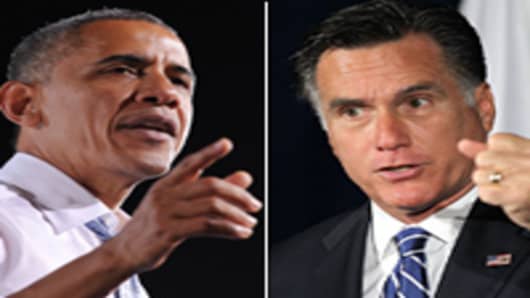President Barack Obama heads into his first debate with Republican challenger Mitt Romney holding a narrow lead, the new NBC News/Wall Street Journal poll shows.
Obama draws 49 percent of the vote among likely voters, compared to 46 percent for Romney. The Democratic incumbent's edge is down slightly from the 50 percent to 45 percent margin he enjoyed among likely voters in mid-September.
The telephone survey of 1,000 registered voters, conducted Sept. 26-30, carries a margin for error of 3.1 percentage points. For results from the 832 respondents whom NBC/WSJ pollsters Peter Hart and Bill McInturff judge likely to vote, the error margin is 3.4 percentage points. (Read More: Voters Say Presidential Debates Will Be Key: Poll)
Rising confidence in the country's direction and its economy, especially among voters leaning toward Obama, continues to undergird his lead. Some 40 percent of voters say the country is headed in the right direction, up from 32 percent in August before the two parties held their national conventions.
A 53 percent majority calls the country "off on the wrong track," but that's down from 61 percent in August.
Positive feelings about the economy, which voters by a wide margin call the most important issue in the election, also have grown. (Read More: Why Democrats Are Feeling Better About the Economy.)
By 44 percent to 13 percent, voters predict the economy will get better over the next year rather than worse. As recently as July, the NBC/WSJ poll showed a near-even split on the question.
By a 57 percent to 39 percent margin, voters say the economy is recovering. Such optimism has helped Obama neutralize Romney's claim to superior ability to accelerate growth; the Republican holds a narrow 3 percentage point edge on handling that issue, half the size of his margin in July.
By contrast, Obama enjoys a 12-point lead on dealing with Medicare, a 9-point lead on dealing with health care, and a 5-point lead on dealing with taxes. By 53 percent to 34 percent, voters favor Obama as better at "looking out for the middle class."
Those findings reflect, in part, the impact of Romney's secretly videotaped remarks asserting that 47 percent of Americans are dependent on government and don't adequately take responsibility for their lives. (Read More: Where the 47 Percent Live.)
By 51 percent to 28 percent, voters said what they've learned about Romney over the past couple of weeks made them feel less favorably toward the former Bain Capital executive rather than more favorably.
Obama also came out comparatively well when voters were asked about his recent remark, assailed by Republicans, that successful business executives "didn't build" their success on the own, since they benefited from external forces such as educators or public investments in infrastructure. (Read More: Obama Regrets 'Syntax' of 'Didn't Build That' Comment.)
By 36 percent to 32 percent, voters said the statement made them feel more positively toward Obama rather than more negatively. Asked about Romney's "47 percent" remarks, 45 percent said they made them regard the Republican candidate more negatively; 23 percent said it made them view Romney more positively.
Romney holds a double-digit lead among white voters, the poll shows. But that's not currently enough to overcome Obama's overwhelming advantage among African American and Latino voters.
Obama's uptick in the polls recently in recent weeks has increased Democrats' optimism about retaining control of the Senate and threatening the Republican majority in the House.
By 47 percent to 43 percent, voters say they prefer Democrats to control Congress after the election rather than Republicans.
Perhaps of greater concern to the GOP, voters by 52 percent to 39 percent call it better if one political party controls both Congress and the presidency. Traditionally, voters have said they prefer divided government to keep either political party from going too far.
—By CNBC's John Harwood
@JohnJHarwood



